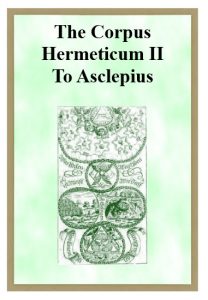Translated
By
G. R. S. Mead
THIS DIALOGUE SETS FORTH THE DIFFERENCE BETWEEN THE PHYSICAL AND METAPHYSICAL WORLDS in the context of Greek natural philosophy. Some of the language is fairly technical: the “errant spheres” of sections 6 and 7 are the celestial spheres carrying the planets, while the “inerrant sphere” is that of the fixed stars. It’s useful to keep in mind, also, that “air” and “spirit” are interchangeable concepts in Greek thought, and that the concept of the Good has a range of implications which don’t come across in the English word: one is that the good of any being, in Greek thought, was also that being’s necessary goal.
The criticism of childlessness in section 17 should probably be read as a response to the Christian ideal of celibacy, which horrified many people in the ancient world. – J M G
1. Hermes: All that is moved, Asclepius, is it not moved in something and by something?
Asclepius: Assuredly.
H: And must not that in which it’s moved be greater than the moved?
A: It must.
H: Mover, again, has greater power than moved?
A: It has, of course.
H: The nature, furthermore, of that in which it’s moved must be quite other from the nature of the moved?
